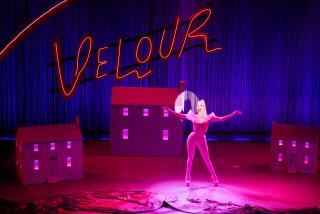SO WHAT EVER HAPPENED TO BAD GIRL ANN SAVAGE?
In 1945, actress Ann Savage gave cinematic life to Vera--one of the most merciless, foul, diabolical and despicable dames ever seen--in “Detour.”
The B movie is the dark tale of a down-and-out hitchhiker, Al Roberts (Tom Neal), who assumes the identity, clothes, car and money of a man who dies while giving him a ride to Los Angeles. He later picks up hitchhiker Vera--not knowing that she’s the one person privy to his secret.
As Vera--the slovenly, chain-smoking drunk with greasy dark hair who describes herself as being “born in the gutter”--Savage blackmails, curses, harasses, belittles and bullies Neal relentlessly throughout the 65-minute black-and-white film, which is now a cult classic. She winds up dead--inadvertently strangled by a telephone cord.
Critics loved “Detour,” directed by B-movie king Edgar G. Ulmer, and praised Savage’s performance. A Hollywood Reporter review described Savage/Vera as “an unglamorous tart,” adding that Savage had risen “to new heights of artistry.”
Over the years, writers have spared no adjectives in describing the role, first originated in the novel “Detour” by Martin Goldsmith. In various articles Savage/Vera has been described as a “spooky nightmare of aggression” with “a constant sneer” and “eyes so terrifying that one wonders how those who beheld her . . . managed to avoid getting turned to stone.”
And Savage’s voice has frequently been likened to Mercedes McCambridge’s demonic intonations in “The Exorcist.”
However, Savage--after appearing as a more beautiful (but still bad) girl in other B movies--faded from the screen as the ‘40s waned and disappeared from show business altogether in the mid-1950s.
She resurfaced last year during an Edgar G. Ulmer film retrospective at UCLA and subsequently attended a second Ulmer festival in Dallas. The Vagabond Theatre is holding a two-day tribute to her on Friday and Saturday; she’s scheduled to appear Friday.
In addition to “Detour,” the Vagabond will screen “The Last Crooked Mile” (1945), a gangster whodunit that co-stars Donald Barry. In it, Savage plays a devious cabaret singer who claims to know nothing of the whereabouts of money stolen by her dead gangster boyfriend.
Savage, now 64 and for the past 14 years a docket clerk receptionist in a prestigious downtown law firm (which she declined to name in print), still chuckles about her baddest bad-girl role in “Detour.”
The slender, soft-spoken blonde, her peaches-and-cream complexion glowing, looks far younger than her age. Gracious and elegant in a silk pants outfit, it was impossible to fathom Savage as the pernicious Vera as she reminisced during a lunch in Hollywood. “Well, the script was so good that it wasn’t difficult at all,” she explained, adding with a smile, “I think Edgar mesmerized me.”
She had arrived in a black Mercedes 280SL carrying a Rodeo Drive shopping bag full of memorabilia (“I wanted to be accurate”) from a career that she left long ago.
She welcomed the Vagabond tribute with modest but obvious pleasure.
“I think the real interest is because of Edgar (Ulmer). The recognition, while posthumous, is growing, not only because of his genius and his talent. Without his direction, ‘Detour’ would have been just another B.”
Savage’s long-dormant acting career may once again surface, with plans under way this year by Rudine-Wittman Films Inc., a Dallas-based production company, to produce, under the supervision of Ulmer’s widow, Shirley, a remake of “Detour” from an original script written by Ulmer before he died in 1972. (Director Peter Bogdanovich originally had the rights to the film, but Shirley Ulmer said that financial reasons caused him to relinquish them last year.)
“They’ve asked me to play the mother of the dead man whose identity is assumed by Roberts,” Savage said, smiling. The part was never in the original film.
Ulmer said in a telephone interview that her husband and the current writer on the project, David Scott Milton (“Born to Win”), carried the story beyond the original premise.
“In the new version, there wasn’t really a part big enough for Ann to do,” she explained, “so we’ve given Haskell (the father of the dead man) a wife who’s a bit of a bitch.”
Ulmer had nothing but praise for Savage’s acting in the original. “My husband saw in Ann a sort of hunger in her eyes and such a lack of conceit and egocentricity that he felt she could play the beaten-up, beaten-down Vera better than any of the other actresses, who would have resorted to makeup and artifice.”
Savage declined to offer casting suggestions for the new Vera. She said only that the part would require “a very earthy actress.”
As she sipped coffee and toyed with her flannel cakes, she reflected somewhat sadly on her “Detour” experience.
“I was very disappointed that I never got the recognition I should have gotten from that performance,” she said. “I just couldn’t seem to adjust to the fact that no one seemed to want to give me a crack at better roles. It was one of the things that really had to do with my dropping out. I was actually hurt by it.”
Ann Savage, born Berniece Lyon, lived in Dallas until she was 9, when her mother and stepfather moved to Los Angeles.
A star-struck moviegoer, Savage went to German producer Max Reinhardt’s acting school at 20 and enrolled in a work-study program. There, she met Bert D’Armand, who became her agent and later, after he divorced actress Jane Randolph, her husband.
“Because I was working for my tuition, I kind of got left out of the choice parts,” Savage recalled. “Finally, Twentieth Century Fox offered me a screen test, but Bert felt that they had so many beautiful blond actresses under contract that I might get lost in the shuffle.”
Instead, Savage ended up under contract to Columbia Pictures. Her experience within the studio system reveals much of Hollywood in the 1940s.
“In those days, I had blond hair until I made a ‘Blondie’ movie with Penny Singleton (“Footlight Glamour” in 1943). They didn’t think it was advisable to have another blond in the picture, so they died my hair red. It wasn’t until much later that I went back to my natural color.”
Savage had little respect for the B movies she made: “They were mindless. The actresses were just scenery. The stories all revolved around the male actors; they really had the choice roles. All the actresses had to do was to look lovely, since the dialogue was ridiculous.”
She admitted that her periodic casting as the “heavy” did offer her a little more in the way of challenges than the sticky-sweet roles. Savage played the tough cookies (“but never as I did in ‘Detour’) in 10 of the 31 films she did in her career.
Unlike youth-conscious Hollywood casting that goes on today, she described actresses then as “dying” to age. “Oh my heavens, we couldn’t wait until our 40s; the older you were, the better parts you got.”
Although she was still in her 20s, “Detour” provided Savage with the part she had been waiting for. “I really wanted to show that I could really be an actress and not a ‘glamour puss,’ which is what we were called. We were photographed only from our best side and not a hair could be out of place. We were never allowed to cry with any ugliness.” Savage rolled her eyes and added, “When you really cry, you’re not that pretty.”
At that point in her career, Savage no longer worked for Columbia but for Producers Releasing Corp., which owned the rights to “Detour.”
Savage said the role, at first, gave her pause. “I had just come off a lot that kept me looking absolutely perfect,” she said, “but Vera was not a pretty woman: She was maniacal. Edgar objected to my hair looking so neat and had the hairdresser run cold cream through it to make it streaky and stringy. He even made sure my face stayed dirty . . . and shiny.”
Following the critical acclaim for “Detour,” Savage had dreams of a real career as an actress. But it never happened.
“I was given an interview with Mr. (David O.) Selznick, but it didn’t go well,” Savage said, almost wincing in remembrance. “Apparently, I didn’t come through with him. I’m not good at selling myself--I got really self-conscious--and you had to be good at that when you talked to a producer of his stature.”
Savage said that she never learned the reason behind Selznick’s disinterest, adding, “I felt very badly about it.”
The actress went on to make other bad-girl movies: “The Spider” (where she also was strangled in the end); “Lady Chaser” (she played a blackmailer), and “Pier 13,” where she attempted to divert a duty-minded shopkeeper/private eye Hugh Beaumont (father to TV’s Beaver Cleaver).
Her career became less important to her, Savage said, after her marriage to D’Armand in 1947. “I’m an extremist by nature,” she explained. “I can only do one thing at a time, and when we got married I was so happy I didn’t want anything interfering. We moved East and traveled a lot--we used to go to Europe at least two or three times a year.”
D’Armand died in 1968, and Savage’s sense of loss is still apparent. “He was the one love of my life,” she said, her eyes beginning to glisten. “After he died, I moved back to Los Angeles and started building my life here.” In addition to working for the law firm, she began taking flight lessons and became a pilot--a hobby she still pursues in a 250 Comanche, which she co-owns with her boyfriend of 11 years.
Imagine, bad-girl Vera flying her own plane.
More to Read
Only good movies
Get the Indie Focus newsletter, Mark Olsen's weekly guide to the world of cinema.
You may occasionally receive promotional content from the Los Angeles Times.










